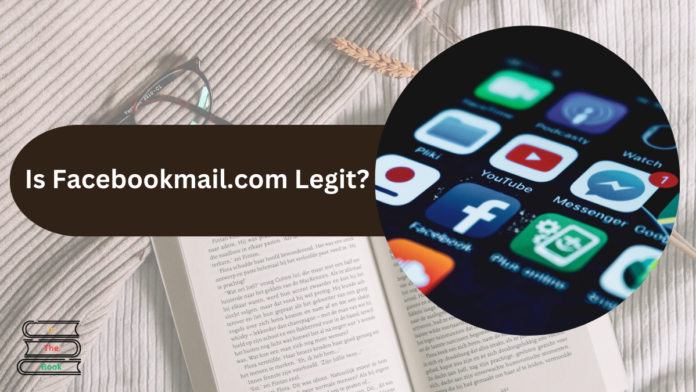In today’s digital age, email communication is a cornerstone of how we interact with online platforms. One common source of confusion is determining the legitimacy of emails from various domains, especially those associated with popular services like Facebook.
A domain that often raises questions is facebookmail.com, frequently used by Facebook to send notifications, alerts, and updates to users. However, with the rise in phishing scams and email fraud, it’s crucial to know how to distinguish between legitimate emails and potential scams.
This guide will help you understand whether is facebookmail.com legit, identify genuine emails, and take appropriate steps if you suspect a phishing attempt.
Contents
- What is Facebookmail.com?
- Is Facebookmail.com Legit?
- Signs of a Legitimate Email from Facebookmail.com
- 1. Sender’s Email Address
- 2. Personalization
- 3. Content and Format
- 4. Requests for Personal Information
- 5. Context of the Email
- Red Flags of a Potential Scam
- Steps to Take If You Suspect a Phishing Email
- 1. Avoid Clicking Links or Downloading Attachments
- 2. Verify Through Official Channels
- 3. Report Phishing Attempts
- 4. Delete Suspicious Emails
- Conclusion
What is Facebookmail.com?
Facebookmail.com is an email domain used by Facebook to send notifications related to user accounts. These emails typically include:
- Alerts about changes to your account, such as password updates or login attempts from new devices.
- Notifications about friend requests, messages, and comments on your posts.
- Security updates regarding your account.
Is Facebookmail.com Legit?
Emails sent from facebookmail.com can include:
- Account Notifications: Updates about password changes, new login attempts, or account modifications.
- Friend Requests and Messages: Notifications for new friend requests, private messages, or interactions on your posts.
- Security Alerts: Warnings about suspicious activity or reminders to enhance your account security.
Signs of a Legitimate Email from Facebookmail.com
When assessing whether an email from facebookmail.com is authentic, look for these indicators:
1. Sender’s Email Address
- Legitimate emails will come from an address ending in @facebookmail.com.
- Be cautious of slight variations or suspicious addresses.
2. Personalization
- Authentic emails usually include your name or account information.
- Emails starting with generic greetings like “Dear User” may signal a phishing attempt.
3. Content and Format
- Facebook emails typically follow a consistent, professional format with correct grammar and spelling.
- Be wary of poorly written emails with typos or odd phrasing.
4. Requests for Personal Information
- Facebook will never ask for sensitive details like your password or credit card information via email.
- Emails requesting such information are likely scams.
5. Context of the Email
- Emails referencing recent actions, such as password updates or new logins, are more likely legitimate.
- Be cautious of unexpected emails with no context.
Red Flags of a Potential Scam
Even though facebookmail.com is a legitimate domain, scams can still occur. Look out for these warning signs:
| Red Flag | Description |
|---|---|
| Urgency or Threats | Emails creating urgency or threatening account suspension are often scams. |
| Poor Grammar/Spelling | Phishing emails often contain grammatical errors or awkward phrasing. |
| Unexpected Requests | Requests to verify your account or provide personal details without reason. |
| Links and Attachments | Suspicious links or attachments lead to unfamiliar sites. |
| Generic Greetings | Emails addressed as “Dear Customer” instead of using your name. |
Steps to Take If You Suspect a Phishing Email
If you receive a suspicious email from facebookmail.com, here’s what to do:
1. Avoid Clicking Links or Downloading Attachments
- Don’t interact with the email. Clicking links or downloading attachments may compromise your data.
2. Verify Through Official Channels
- Log in to your Facebook account via the official website or app to check for notifications.
- Avoid using links provided in the email.
3. Report Phishing Attempts
- Use Facebook’s help center to report phishing attempts. This helps prevent future scams.
4. Delete Suspicious Emails
- Once you’ve verified that an email is a scam, delete it from your inbox to avoid accidental interaction.
Conclusion
Facebookmail.com is a legitimate domain used by Facebook to communicate important updates and notifications. However, due to the prevalence of phishing scams, it’s essential to approach such emails with caution. By knowing how to identify authentic messages and recognizing the signs of scams, you can safeguard your personal information and maintain your online security.
Whenever in doubt, verify the email’s authenticity through Facebook’s official channels and report any suspicious activity. Staying vigilant is your best defense against email fraud.
Click here to learn more

Chandler is an avid automobile enthusiast who is passionate about all things on wheels. From the latest car models to classic vintage rides, I love exploring the automotive world’s intricate details and engineering marvels. With years of experience in test-driving, reviewing, and analyzing cars, I provide readers with comprehensive insights and honest opinions.



























